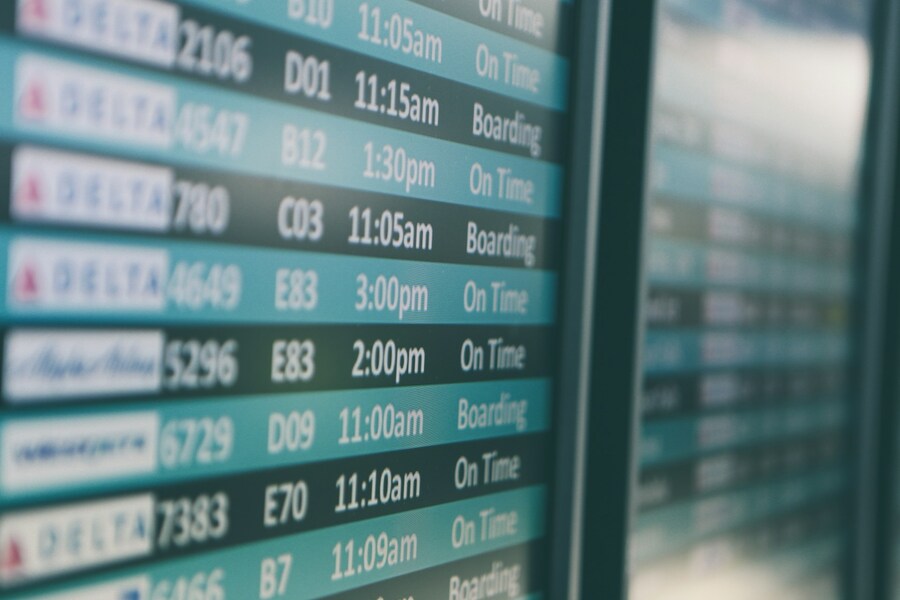This summer is already shaping up to be a record-breaking one, and the Fourth of July holiday, one of the biggest travel periods of the season, is just around the corner.
According to AAA, more than 70 million Americans will be hitting the road this Independence Day, traveling at least 50 miles from home. That represents a 5% increase from last year and an 8% spike compared to 2019.
This surge in travel will undoubtedly mean busy airports, which has been the norm throughout the summer anyway. In fact, 7 of the 10 busiest days ever recorded at Transportation Security Administration (TSA) checkpoints have occurred since Memorial Day weekend, with the all-time high on June 23rd. This surge includes some of the busiest days ever seen at US airports.
Travelers can expect crowded conditions throughout their holiday journeys, whether they're visiting a theme park in Orlando or a popular destination in Europe. From packed airport parking lots to busy security lines and tourist-filled attractions, the upcoming weeks are sure to be a busy time.
However, there are also reasons to be optimistic this summer holiday season. Unlike the previous 2 years, it's now easier to find good deals on airfare, and there are plenty of opportunities to score great mileage redemptions.
In addition, the airline meltdowns that plagued air travel in 2022 are largely a thing of the past, with cancellation rates much better than they were 2 years ago.
Whether you're still finalizing your Fourth of July getaway or already starting to think about your next trip, it's important to be aware of the current travel landscape and plan accordingly. Let's get to it right now!
Smooth sailing or scramble… What to expect for Fourth of July air travel?
When is the worst time to travel for the Fourth of July?
 Source: Chanan Greenblatt/Unsplash
Source: Chanan Greenblatt/Unsplash
Unlike Memorial Day, which always falls on the same day of the week, predicting the busiest travel day for the Fourth of July holiday is a bit more challenging.
Last year, the Fourth of July holiday was on a Tuesday, and the Friday before (June 30th) turned out to be the peak travel day, with a staggering 2.8 million passengers going through TSA checkpoints. At the time, that was a single-day record, but it has since been surpassed 7 times, including twice in the past week alone.
This year, the Fourth of July falls on a Thursday.
Based on the travel forecasts, the pattern we usually observe around the Thanksgiving holiday comes to mind. As everyone knows, Thanksgiving consistently falls on a Thursday each year.
A bustling weekend leading up to the holiday
It looks like there will be a significant influx of travelers getting an early start on their summer getaways, potentially turning the entire week into a vacation period.
The Hartsfield-Jackson Atlanta International Airport (ATL), which is the world's busiest airport, is expecting this Friday, June 28th, to be one of its most crowded days during the travel rush. The airport authorities announced that they foresee a total of 367,000 travelers passing through ATL on that specific day.
Moreover, United Airlines is predicting that Saturday, June 29th, will be among their busiest days in terms of passenger volume.
In total, the airline anticipates its busiest Fourth of July holiday on record, with plans to transport more than 5 million customers between June 28th and July 8th – a 7% increase compared to the previous year.
The final push on July 3rd
Similar to the Thanksgiving holiday, the Wednesday just before the weekend is expected to see a substantial last-minute rush as well.
According to the travel booking app Hopper, airlines have scheduled the highest number of available seats on July 3rd.
Expecting big crowds to return on the Sunday and Monday after the holiday
Hopper, along with officials from United and Atlanta Airport, anticipate significant crowds returning from the holiday on Sunday, July 7th, and Monday, July 8th.
To continue the Thanksgiving comparison, it's important to note that the Sunday after the holiday is frequently the busiest airport day during the entire travel season. It's reasonable to expect a similar trend to occur next week following the Fourth of July.
How often do flights get delayed or canceled?
 Source: Matthew Smith/Unsplash
Source: Matthew Smith/Unsplash
For those concerned about another potential air travel disruption, take comfort in the fact that the current summer season has seen a relatively strong start so far.
Since the Memorial Day weekend, US airlines have collectively canceled only 1.4% of their flights, according to data provided by FlightAware.
This figure stands in stark contrast to the 2.9% of flights that had been canceled at the same point in 2022.
While the cancellation rates are slightly higher than they were last summer, when US carriers had canceled just 0.9% of flights, the overall situation appears to be more stable compared to the previous year, offering a sense of cautious optimism for air travelers.
Delays
This summer, US airlines have experienced a fairly high rate of flight delays, with approximately 24.2% of flights being delayed, according to FlightAware. This figure represents a slight increase from the previous years of 2022 and 2023.
The Federal Aviation Administration (FAA) is currently facing a nationwide shortage of air traffic controllers, and weather conditions are frequently the most complex factor they have to contend with. Weather conditions, particularly summer thunderstorms in heavily trafficked regions like the Northeast, mid-Atlantic, and Florida, often exacerbate the situation, leading to widespread disruptions across the country.
It's important to note that even if the skies appear clear, your flight may still be delayed due to weather-related issues in other parts of the country.
Despite these challenges, the overall performance this summer has been fairly encouraging.
As a precaution, it's recommended that you familiarize yourself with your rights as a passenger before embarking on your travels. In addition, booking your trip using a credit card that includes trip insurance protections can help offset any extra costs you might incur due to flight disruptions, such as hotel stays, meals, and ground transportation.
Are flight prices becoming more affordable?
 Source: Andrew Dawes/Unsplash
Source: Andrew Dawes/Unsplash
This summer has brought some fantastic news for travelers, with a significant increase in available flight deals and redemption opportunities. While the holiday season may lead to elevated fares compared to the rest of the summer for many itineraries, the good news is that average domestic airfare for the holiday is down around 18% from last year, according to Hopper.
If you're dreaming of a trip to Europe, the news gets even better. Hopper's projections show that fares to Europe are down by around 37%, making this an excellent time to plan that European getaway you've been longing for.
As is typical with major holidays, your best chance of securing a great deal may be to depart on the holiday itself and return a bit later than the crowds. If your schedule allows, consider flying out on the holiday and returning on the Tuesday or Wednesday after when the demand may be a bit lower. This flexible approach could help you snag some fantastic savings on your travel plans.
Hitting the road for the Fourth of July
The majority of holiday travelers will be taking to the roads this season.
INRIX, a transportation data and insights firm, predicts that the afternoons of Wednesday, July 3rd, and Sunday, July 7th, will be the most congested periods nationwide.
The current gas prices are more favorable compared to a month ago and a year ago, with regular gas averaging $3.44 per gallon.
If you're filling up for your Fourth of July travels, remember to use a credit card that offers bonus rewards for gas purchases.
Helpful suggestions for Fourth of July travel in 2024
 Source: Cara Grobbelaar/Unsplash
Source: Cara Grobbelaar/Unsplash
If you have plans to travel this Independence Day, there are a few important steps you should consider taking. These preparations will help ensure your holiday journey is smooth and enjoyable.
1. Use Google Flights to compare fares
Searching for flight fares has become more convenient with Google Flights. This platform now allows users to compare prices across multiple airlines, including Southwest Airlines, the fourth-largest airline in the United States.
Once you've found the ideal itinerary using the search engine, you can proceed to book your flight directly with the airline of your choice.
2. Book flexible hotel reservations
Booking a hotel room that allows you to cancel without any penalties is often the smarter choice, even if it means missing out on a slightly lower price by paying upfront.
Keeping your reservation flexible is especially beneficial if you're traveling to a major US destination. According to Hopper, hotel rates in popular cities like New York and Las Vegas have been on the decline as the check-in date approaches.
In such cases, your best strategy is to book a standard room reservation, as opposed to prepaying. This way, if the price drops later on, you can simply cancel your initial booking and rebook at the lower rate.
3. Earn points for your travels
With many hotel brands now using dynamic award pricing where the points required can vary along with cash prices, it's a good idea to use a similar approach if you're booking with your loyalty points. Most programs will refund your points if you cancel an award stay. This means you can then rebook at the lower redemption rate if you find the points price has dropped after your initial booking.
 Source: frank mckenna/Unsplash
Source: frank mckenna/Unsplash
4. Reserve airport parking in advance
Planning ahead for your airport parking can save you both time and money, while also helping you avoid the potential hassle. And we're happy to say that our smart booking platform – ParkingNearAirports.io – offers convenient and inexpensive off-site parking options near major airports across the United States like Hartsfield-Jackson Atlanta Intl and Denver Intl, including cheap parking near Atlanta Airport and affordable Denver Airport off-site parking. With our wide selection of parking lots and garages, you can easily find the perfect spot to leave your car while you're away. Plus, we offer special airport parking coupons to help you save even more. Why stress about finding parking at the last minute when you can reserve your spot ahead of time with us? Book your affordable off-site airport parking today and start your trip off right!
5. Explore your travel programs and apps
Global Entry and TSA PreCheck can be incredibly helpful when airports are bustling with travelers. But even if you're not a member of these programs, there are still ways to make your journey a bit smoother.
Download the MyTSA app to keep an eye on the wait times at the security checkpoint where you'll be passing through. This can give you a heads up on when to arrive at the airport to avoid long lines.
And if you're coming back from an international trip without Global Entry, you can still bypass the longest queues by using the free US Customs and Border Protection Mobile Passport Control (MPC) app to submit your information ahead of time.
Conclusion
These little tricks can make a big difference when the airports are packed. Give them a try and enjoy a more streamlined travel experience!






